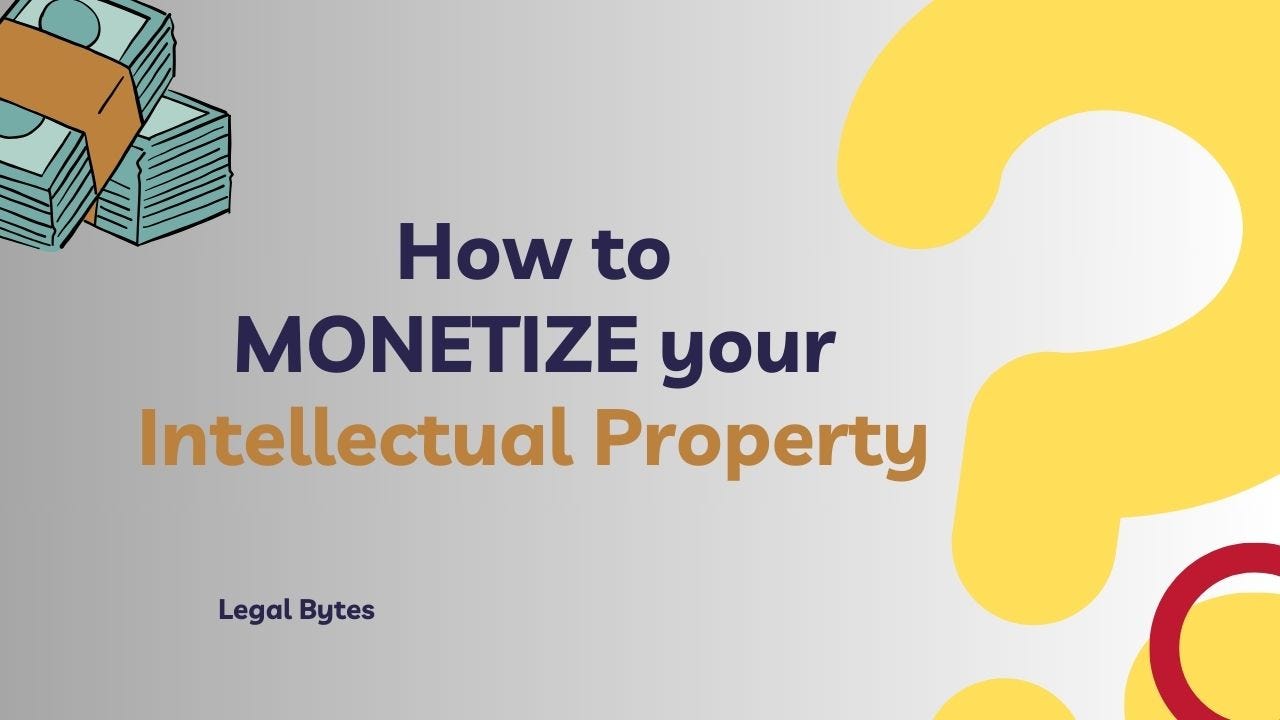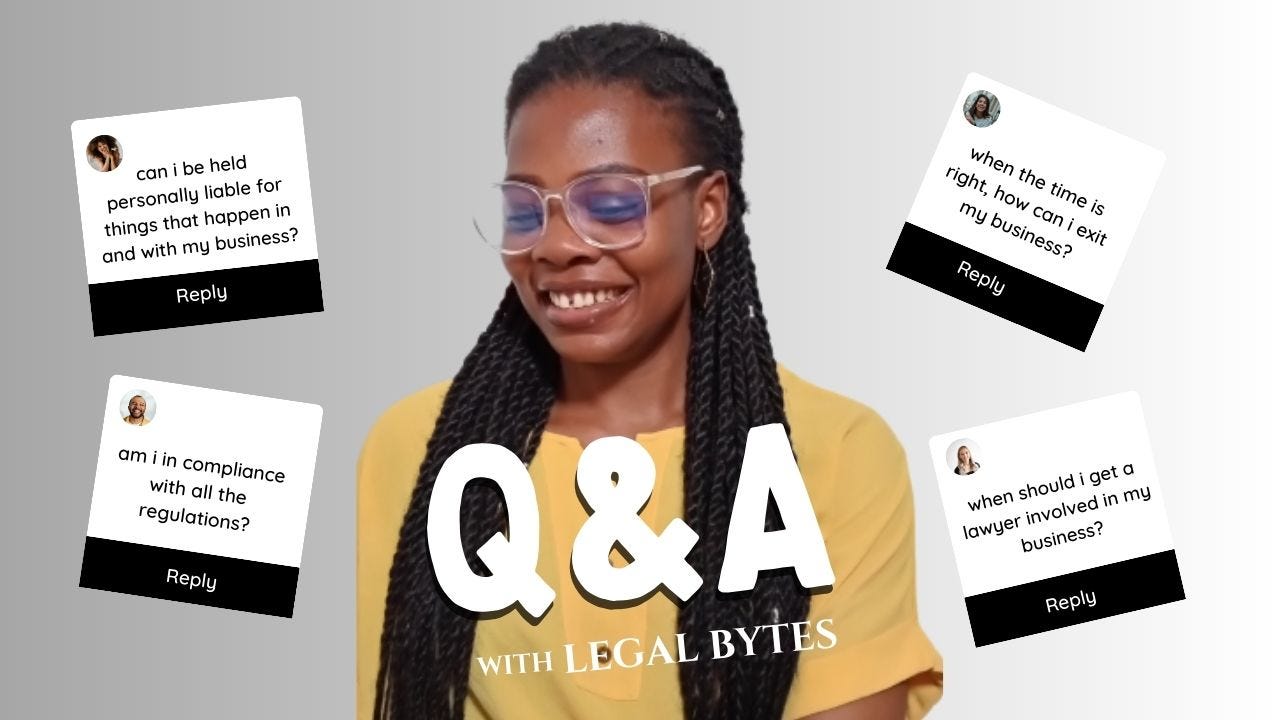How to MONETIZE YOUR INTELLECTUAL PROPERTY
If you're a tech entrepreneur, creator, and business, your intellectual property might be your most valuable asset, but how can you monetize it? Let me tell you...
In today’s digital and knowledge-driven economy, your intellectual property (IP) could be one of your most valuable assets. Whether you’re a business owner, content creator, artist, or tech innovator, knowing how to monetize your IP will unlock new revenue streams and give you a competitive edge in your industry.
But how exactly do you turn your ideas, trademarks, patents, copyrights, and trade secrets into money? In this guide, we’ll break down the legal and business strategies you need to protect, license, and profit from your intellectual property in Nigeria and globally.
Understanding Intellectual Property (IP)
Before you start monetizing, it’s essential to understand the different types of intellectual property and how they can generate revenue.
Types of Intellectual Property:
Copyright – Protects original works of authorship fixed in a tangible form of expression and grants the owner exclusive use and protection from copying or unauthorized distribution and such other rights. Examples of original creative works like books, music, films, and software.
Trademarks – are identifiers unique to your service, product, and brand. It covers names, logos, slogans, audiovisuals, or anything that distinguishes you from others in the market. It covers brand names, logos, slogans, and distinctive signs that set businesses apart.
Patents – Protect new inventions and grant the inventor exclusive rights to use & commercialize the invention for a certain period.
Trade Secrets protect confidential business information that gives your business a competitive advantage in the market. They include algorithms, proprietary processes, customer data, pricing models, business strategies, and more.
Each type of IP has different legal protections and monetization opportunities. Let’s explore how to capitalize on them.
Ways to Monetize Your Intellectual Property
1. Licensing Your IP
Licensing is the most common way to generate revenue from your IP. It involves granting another party permission to use your intellectual property in exchange for a fee or royalties.
Types of Licensing Agreements:
Exclusive License: Grants one party the sole rights to use the IP within a specific market or region.
Non-Exclusive License: Allows multiple parties to use the IP simultaneously.
Sublicensing: Enables the licensee to further license the IP to third parties.
How Licensing Works for Different IP Types:
Copyright Licensing: Allows others to use your creative work while earning licensing fees or royalties (e.g., musicians licensing songs for commercials, authors licensing book rights for movie adaptations).
Trademark Licensing: Lets businesses use your brand name or logo while receiving a percentage of their revenue (e.g., franchises, merchandise branding, etc.).
Patent Licensing: Allows companies to produce and sell your patented invention for a royalty.
Trade Secret Licensing: Grants permission to use confidential business methods or proprietary knowledge under strict confidentiality agreements.
Key Considerations When Licensing Your IP:
Clearly define rights and limitations in the agreement.
Establish payment terms (fees, royalties, lump sum, or hybrid payments).
Include termination clauses and dispute resolution mechanisms.
Ensure compliance with Nigerian and international IP laws, where applicable.
2. Selling Your IP Rights
If you prefer a one-time payment over long-term royalties, you can sell your IP rights outright. Selling IP is ideal when you no longer want to manage it or need immediate capital.
Types of IP Sales:
Patent Assignment: A full transfer of ownership rights to another entity.
Copyright Assignment: Selling rights to books, films, or software.
Trademark Sale: A business acquiring a trademark for branding purposes.
Trade Secret Sale: Selling proprietary formulas or business processes.
💡 Example: A Nigerian software developer who creates a popular mobile app can sell the source code and rights to a tech company for millions.
Key Considerations When Selling Your IP:
Determine the market value of your IP.
Draft a legally binding contract outlining transfer details.
Include warranties and indemnification clauses to protect against future disputes.
Ensure compliance with relevant tax regulations on IP transactions.
3. Franchising Your Business
Franchising is a powerful way to scale your business by licensing your entire business model, including trademarks, operational methods, and branding.
How Franchising Works:
The franchisor is the original business owner who licenses out the business model and brand.
The franchisee: The individual or company that pays for the rights to operate under the franchisor’s brand.
Elements of a Franchise Agreement:
Trademark License: This allows franchisees to use the business’s brand name and logo.
Operational Guidelines: Provides a standardized method for running the franchise.
Royalty Payments: Franchisees pay a percentage of their earnings to the franchisor.
Marketing and Support: Franchisors often provide training, advertising, and business support.
💡 Example: Nigerian fast-food brands like Chicken Republic or Kilimanjaro expand by franchising their brand and operational model to local business owners.
Key Considerations When Franchising Your Business:
Ensure strong brand recognition and operational success before franchising.
Develop a franchise disclosure document detailing rights and obligations.
Establish a consistent quality control process to maintain brand reputation.
Register your trademark to protect your brand identity.
Comply with Nigerian franchise laws and international franchise agreements.
4. Creating Digital Products & Membership Platforms
If you own copyrighted content, consider creating:
Online courses (teaching a skill based on your expertise)
E-books (guides on niche topics)
Subscription-based platforms (exclusive content for members)
💡 Example: A lawyer who specializes in IP law can create an online course teaching businesses how to protect their intellectual property and charge a membership fee.
5. Enforcing Your IP Rights (Litigation & Settlements)
Enforcing your rights can lead to financial settlements if others use your IP without permission without permission.
Trademark Infringement Cases – If a company uses your protected brand name without authorization, you can demand compensation.
Copyright Infringement Claims – If someone reproduces your work without a license, you can take legal action.
Patent Infringement Cases – Tech innovators often sue companies that use their patented technologies without consent.
💡 Example: A content creator discovers their viral video is being used by a brand without permission and demands payment for its use.
6. Leveraging IP for Investment & Business Valuation
Many startups use their IP as a bargaining tool when seeking funding. Investors are more likely to fund businesses with protected and monetizable intellectual property.
Example: A fintech startup with patented blockchain technology can attract investors by showcasing its unique IP portfolio.
Legal Considerations for Monetizing Your IP
To maximize your earnings, ensure you legally protect your intellectual property:
Register Your IP: File trademarks, patents, and copyrights to secure ownership rights.
Use Contracts: Draft clear agreements for licensing, franchising, and sales.
Monitor Infringement: Keep track of unauthorized use of your IP and take legal action if needed.
Understand International Laws: If you plan to expand globally, ensure compliance with international IP laws.
Conclusion
Monetizing intellectual property is not just for big corporations—it’s an opportunity for entrepreneurs, creatives, and small businesses to maximize their assets. Whether through licensing, selling, franchising, or leveraging IP for investment, there are many ways to turn your ideas into income.
Take Action: If you own intellectual property, start by assessing its value and exploring monetization strategies. Protect your rights legally and seek expert guidance where necessary.
By understanding and utilizing IP monetization strategies, you can turn your creativity and innovation into a sustainable source of income.
Need help protecting or monetizing your IP? Contact a qualified intellectual property lawyer for guidance.
About Legal Bytes
We are Adune Legal’s weekly Newsletter, which simplifies the Law for Busy Executives, Entrepreneurs, and Tech Enthusiasts interested in the legal aspects of Business, Technology, and Intellectual Property.
We love emails from our readers— reply to this email and let us know your thoughts and suggestions.
WAIT!!!
Become a paid subscriber and access;
Q&A sessions with Nneoma Grace via chats on Substack.
Detailed Legal Templates and examples to save you time and legal fees
Expert Interviews and Case Studies
Don't miss out on these perks - subscribe today and start enjoying it!
Thanks for reading Legal Bytes
Adune Legal’s Team
P.S. Like Legal Bytes? Please forward us to a friend.
P.P.S. Was this publication forwarded to you? Sign up here & see previous publications.





